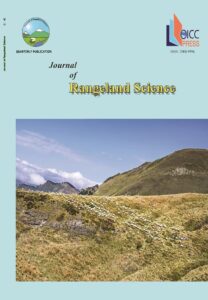Climate Change Impact on Quality of Life Indicators of Pastoralists (Case study: Rangelands of Haraz River Basin, Mazandaran province, Iran)
Authors
Abstract
Climate changes pose great threats to the main services of ecosystems such as food security, water security and health. This research was carried out in Haraz river basin rangelands, Mazandaran province in the north of Iran in 2015-2017 to analyze the perspectives of Haraz river basin (HRB) pastoralists about climate change. From 5236 local pastoralists, the sample size was consisted of 350 ones based on Cochran formula. This study was conducted in 130 custom units (Samane Orfi) in HRB. At first, a questionnaire with 13 main criteria and 31 indicators related to quality of life was prepared and filled by local pastoralists. Cronbach’s alpha was varied from 0.72 to 0.88. Independent indicators were compared via Mann-Whitney U test using SPSS 16. Rangelands of HRB were divided into two parts due to having a wide variety of environmental factors and management. Most of pastoralists believed that climate changes occurred in HRB and also, there was a strong convergence between the perspectives of two pastoral groups (pastoralists of Baladeh and Larijan) with long-term trends in all weather stations about changes in climate characteristics. The results of Mann-Whitney U test showed that pastoralists perceptions of climate change impact on quality of life indicators differ significantly in terms of increased migration, anger, frustration, conflicts between the pastoralists, decreasing sympathy, reduced sense of responsibility between pastoralists, reduced pastoralists‘ participation in the range management actions, reduced effective participation in the improvement measures, increased distance between livestock pen and water resources (p<0.01) and reduced food intake regardless of health and management of livestock diseases and loss of social cohesion (p<0.05). It means that two groups believed that these indicators have been affected by climate changes with different weights. But no significant differences were observed for other indicators. The most important impact of climate changes from the perspectives of Baladeh pastoralists was on water quantity, migration, job insecurity, future expectancy and social conflicts with coefficient of variations of 0.207, 0.22, 0.297, 0.299 and 0.30, respectively with negative impacts. Larijan pastoralists believed that climate changes had the most important impact on migration, water quantity, future expectancy, social conflicts and job insecurity with coefficient of variation involving 0.26, 0.263, 0.277, 0.29 and 0.323, respectively with negative impacts. Although proper interpretation of regional climate change pattern is provided by pastoralists, extension services and increasing social awareness associated with global warming and climate changes should be prepared to cope with potential future threats of climate changes.



